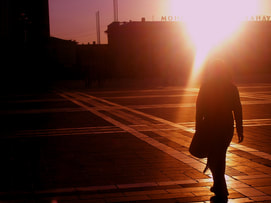 On my two-hour drive to Roanoke, I planned my day: see if I can check-in the hotel hours before what was listed on the reservation, find a coffee shop, write poetry and write poems, maybe nap. Surely, I can finish a manuscript in 24 hours if I'm away in a city I've not been before! But here I am, towards the end of my day, sitting under a covered patio listening to the rain. I have riffed one poem by ink on page but that’s it. It’s been four years since I began this journey. Let that sink in. Four years of me visiting rural, Southern African American churches and cemeteries. Not every Sunday or every month, but still, I’ve been on this path for four years. That seems to be a long time to hold stories of the dead and of the past. Untold stories. Buried stories. Stories that carry more than my weight. So why hasn’t it come pouring out of me like the rain is pouring out of the clouds? Today, I have no distractions, no opposing deadlines, no previous obligations. No place to be. No one who needs my attention. It’s me and the page, as I’ve dreamed for weeks. I have everything I need. I've done the research. I’m here. I’m ready. I’m waiting. That’s when the interview I had a few days ago with Hillary, a freelance writer who is working on a piece for a magazine, seeps through my desperate thoughts; and how I wished I could have provided clearer answers for her – what exactly I’m doing, hoping for, expecting, planning with this poetry project. But, here is when I realize that just as the work itself, is me – all over the place, beautifully complex, undefined, contradictory, nuanced, still in process. And just as deeply rooted and buried are the stories is the time it takes to unpack them. I am learning to give myself mercy. I am remembering the energy it takes working a full-time job in addition to contracting as a corporate trainer, and having my own business, which includes running and editing a small yet international quarterly journal. I believe in a God that would want me to grant myself mercy and patience. This isn't excuse making, nor is it procrastination. This is the creative process. And as of now, I’m enjoying this time away to be a poet only. That includes more than writing poems. It means reading, studying, seeing, resting, wrestling, aspiring to hone the craft. From that, the collection will continue to shape itself. Through it all, is mercy. Mercy and patience.
2 Comments
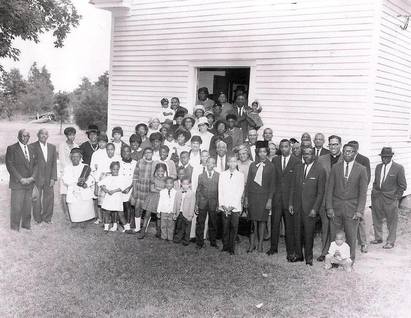 (Pictured in front of this church is my father, the Late Rev. Dr. William M. White, Sr. (third rt, front), and his father, the Late Rev. Reid R. White, Sr. (second rt, front), along with my mother, Brenda W. White, and others I do not know. Circa 1960. Somewhere NC.) (Pictured in front of this church is my father, the Late Rev. Dr. William M. White, Sr. (third rt, front), and his father, the Late Rev. Reid R. White, Sr. (second rt, front), along with my mother, Brenda W. White, and others I do not know. Circa 1960. Somewhere NC.) I wasn't sure what church I wanted to visit to "end" this phase of my research. I vacillated between two I had never visited nor did I know anyone connected to the church (I found them through a Google search). I decided on one that didn't have a website, and the number listed was disconnected. I arrived early because I've had the experience of showing up at churches sometimes at 11:00 a.m. only to open the doors an hour after service began. After arriving through twists and turns (some of them missed), I parked in the empty gravel lot, grabbed my camera, and made myself at home on the land at the end of a one lane dirt road. I said prayers of protection; had my car pointed in the direction of a quick exit, if need be; and I walked through the cemetery and around the church building. I looked at dates on tombstones and etched on bricks on the side of the building. When I began this journey, a couple of years ago, of visiting the "old church," I thought of my father and Grandfather. They were both pastors in the A.M.E. Zion Church -- traveling, ministering, and working in the South, mainly. I thought of their passion and persistence to "preach the Good News" in time of deep racial and financial struggles. These two steadfast and faithful men, with little to their name, sacrificed more than I will ever know or understand. So, when my uncle -- one of my Dad's brothers who is also a minister -- suggested we go back in time to visit the churches my father and/or Grandfather had served as pastor before they passed (my Dad in 1996 and my Grandfather in 1988), it was a no brainer. It was an automatic, "Yes!" Uncle LeRoy and I would hop in my car every first Sunday and drive to one of the rural churches. I had only heard of these churches but hadn't visited many of them. They were, after all, "before my time." After each Communion service, I found myself not able to let go of the experience. What was sparked by the sermon, or the church Mothers, or a song, or the cemetery turned into poetry. So, I wrote a grant because I wasn't done traveling. I wasn't done looking in the back of these small churches at their cemeteries. I wasn't done hearing the stories of those who served these churches for decades. Thankfully, there were those on the grant committee and others who saw the vision that was birthed deep inside of me, probably before I realized it, and I was awarded funds to continue to travel the South, exploring the hidden churches, or "gems;" to unearth what many of us have forgotten, if we knew it at all. Eventually, these photos and conversations, and silent walks through cemeteries in the rural South of those whose name I do not bare will turn into poetry. Piles of poetry. But, if I'm honest, I will tell you that after six months of research, until today I've wanted to stay "in the field" researching. I haven't felt ready to write. There was more digging to do. More understanding to gain. More space that has needed to be opened up inside of me. I've been waiting on something to say, "Go, now you're ready..." As I write this from a coffee shop in the city I call home, I believe I am now ready to pull my notes from the journal I've carried to all 20 churches and cemeteries (10 of which were before the grant) and scribblings on church bulletins, and write. The Winston-Salem/Forsyth Co. Arts Council blessed me with the Duke Energy Regional Artist Grant to support my research. 100 West Corsicana, in TX, has awarded me a weeklong residency to write. And the timing of it all could not be better. Here's why. (Back to the "last church" I visited as part of the research grant...) The pastor pulled up and I immediately yet slowly and deliberately told her who I was and why I was there. (After all, I'm a stranger in gym shoes and a dress, carrying a 35 mm camera, without any invitation or permission.) She welcomed me warmly like I was long lost child. During service, she asked if I would tell the small congregation who I was and why I was there. I did and added that I would love to talk to anyone after service who had history of the church and the cemetery. About an hour or so later, as the pastor was getting ready to pronounce the Benediction, a lady a few rows behind me said she had something to share. "I was looking through tax papers a week ago and came across history of the church my deceased brother wrote. I don't know what it was doing in those stacks of papers but I, right then, put it somewhere safe so I would know where it was in case I needed it. later" She continued, "So, I snuck out during service to make a copy of it when this young lady said she wanted to know about the church. It has everything (she looks at me), that you want to know, included who is buried in the cemetery. It's confirmation that God is in this." I got chills as I sat on that church pew alone. The pastor then prayed -- and she prayed for me and my travels and this research and my gifts. I thought of a phrase my Dad would say when overwhelmed: "Words are poor tools." After service, the "Mother of the church," came up to me (she's also the mother of the lady who went home to grab the research paper to give to me) and we talked. She's been a member of that church for more than 50 years. She was patient to answer my many questions. As we wrapped up she said, "We're small but we're happy." I told her I was happy, too; and that this research took me back to my roots. You see, this may have begun as a "Faith of our Fathers" tour, but it has ended with a deepening of my own faith journey. I am thankful. The journey continues. Next up is poetry. Piles of poetry. Let the church say, Amen. (Want to see pictures from the 10 churches/cemeteries I've visited during this 6 month grant period? Take a peek by clicking here.) As an informed writer, I have more to work with, more inspiration, in a sense. 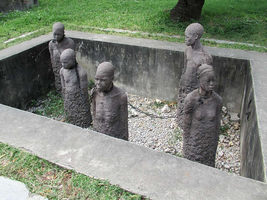 What comes first in writing: research or inspiration? I say inspiration! It fuels the research and hones craft. But, when I began my journey as a poet decades ago, I thought whatever I was inspired to write would come to the page as it was meant. Now, I see the difference reading and researching make. As a more informed writer, I have more to work with, more inspiration, in a sense. It's the perfect balance for someone like me who likes to use both sides of my brain -- fall in love but think about it first :-). So, with the project I'm currently working on, thanks to the Duke Energy Regional Artist Project Grant through the Winston-Salem/Forsyth Co. Arts Council, I'm digging deeper into the research of African American churches and cemeteries. I thought, in case there is someone else who can't ignore the pull to know more about this part of our history, I would create a list of websites I have found with the most helpful and comprehensive information. Of course, you can do your own Googling, but since I'm doing it, I might as well share. I will add to this list as it develops. Feel free to email me should you find information you think would be helpful to me or someone else! Links to Online Resources
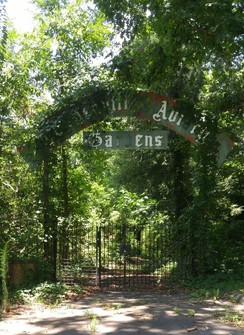 Yesterday, I passed a "No Trespassing" sign to get to a cemetery that was locked and abandoned. Well, not literally abandoned -- I believe the buried are still there -- but forgotten. It got me thinking about a conversation I had with someone a few years ago. Does love die when people die and those who were to remember them forget? I believe love doesn't die, but if love is in the heart of those alive and they die (which we all will, eventually), where does the love go? Maybe that's why I'm so interested in cemeteries. Perhaps it's deeper in that I am more interested in love and remembering -- even if I don't know those whose names are on markers, or those whose names are not known (or thought important to place on a marker). There was a burial taking place at one of the three cemeteries I visited yesterday. I talked to the three men who were placing the casket in the ground, shoveling and then bulldozing dirt on top of it. I asked if they knew who was buried. If it was a man or woman, the age. One of the men turned around a small sign stuck in the grass near the plot for me to see it. It was a lady born in the early 1930s. I said a prayer that she had a fulfilling life and that she will be remembered. What is life if when we leave we do not leave something worth remembering behind? If someone doesn't remember you, in love? Aren't we, in some ways, living to die? So, when I get to the "abandoned" cemetery, with locked gates, grass and trees overgrown, I wonder who is there and what happened to those who know them? Did they not tell their children about who is there and the significance of remembering? Is there something we (the general public) need not to know? Why can't we visit? Freely walk the grounds? A friend called yesterday. When I told him where I was and what I was doing, he asked what is it about visiting cemeteries that interests me. I told him I didn't know for sure but wanted to follow this inner rhythm and see where it leads. I wonder if some of this interest is to make friends with death. Not in a way that I desire death (trust me, I love and am thankful for life), but in a way that I do not want to fear it. Being single and not having children, I wonder if anyone will visit me when I am buried. I won't know if they do or not :-), and visiting is more for the living than the dead. But visiting, placing flowers, taking pictures, researching the history of the cemetery and those who are buried is part of my journey to honor the sacredness of life and death. There are stories to be told, even in our forgetfulness. Slowing down, being quiet and walking in sacred spaces (like cemeteries) is one way that I connect in the thin, fragile space where I am fully alive in fleeting moments. It may not make all the sense in the world but who has time for that? There are other threads to follow.
Spirits would greet us at the car when we pulled up in gravel lots like they knew we were coming, and were glad to see new faces... This was something I would come to realize pretty quickly that I needed to write about. Actually, it’s as if I was chosen to give voice to that which many of us no longer hear or see in our busy, overcrowded lives. I’m reading Soul Survivor: An African American Spirituality as I begin this second leg of my journey into what feels like a deserted but once lively area of the rural black south. I'm having a conversation with the words on the pages. As the writer has penned about the necessity of the black church in the black life, I am saying "Amen," or asking questions, or underlining phrases I need to contemplate further. It's my companion guide as I expand this escapade that started two years ago when one of my Dad’s brothers and I started talking about the black church. Having both grown up as PKs (preacher’s kids), Uncle LeRoy and I sat outside -- having breakfast at Mary’s, downtown Winston-Salem -- when he said, “Let’s go. Let’s visit the churches your Dad and my Dad [both now deceased] served as pastor that you haven’t been to.” It was a suggestion. A passing thought. A “sounds like a good idea” idea when you have the Labor Day weekend carefreeness on your skin. But it went beyond us talking. Beginning in 2015, every first Sunday of the month, which is usually Communion Sunday in the protestant church, Uncle LeRoy and I would choose a church; and decide a place to meet or for me to pick him up from his Salisbury home – where my grandparents used to live. I always happily drove while he would give me directions: “Turn here, at the corner store.” Or “Once we pass the railroad tracks...” He would share stories of growing up in the community we were visiting for the day. After service we would ride around and he would tell me who lived where, what my Dad was like as a child; show me the houses that burned, the stores that are now closed. A walk into family's history that spans more than one city, one church, one generation. I noticed, too, the cemeteries next to the small - could be thought of as abandoned - churches. Spirits would greet us at the car when we pulled up in gravel lots like they knew we were coming, and were glad to see new faces. This was new to me since during my childhood my Dad pastored larger city churches. This was something I would come to realize pretty quickly that I needed to write about. Actually, it’s as if I was chosen to give voice to that which many of us no longer hear or see in our busy, overcrowded lives. That was the impetus of me applying for the Duke Energy Artist Project Grant through the Arts Council of Winston-Salem/Forsyth County. And they caught the vision, or at least had enough faith, to support my continued research for a collection of poetry and photography of southern African American churches and cemeteries. The circle has widened. This part of the journey I'm visiting churches outside my direct family relations. But the essence has remained -- that which those in the pews (and myself) are searching for -- seems to be the same. Now through September (which is when the report for the grant is due), I will be visiting the "forgotten by the masses but still present for the few" churches and cemeteries. I will be looking and listening. Wading and wondering. Writing and rewriting. I will be reading what others have written about African American spirituality and poetry. I will be pulling and placing words in ways I have not before. I do not know what the journey holds. I cannot know. But I am trusting it and the path. I empty myself of that which will cloud my perception. I am peeking into the past where I now stand. I have taken off my shoes to enter this sacred space. I have opened myself to this experience. I will share pieces with you, that we might feast together. This is my life as a poet, artist, researcher, and spiritual being. This is the gift I have been given and humbly accept. |
AuthorI'm a poet in love with oral history and stories of the ancestors. Here, I will record what I discover and contemplate on my journey into historical African American churches and cemeteries in the South. Archives
June 2018
Categories |
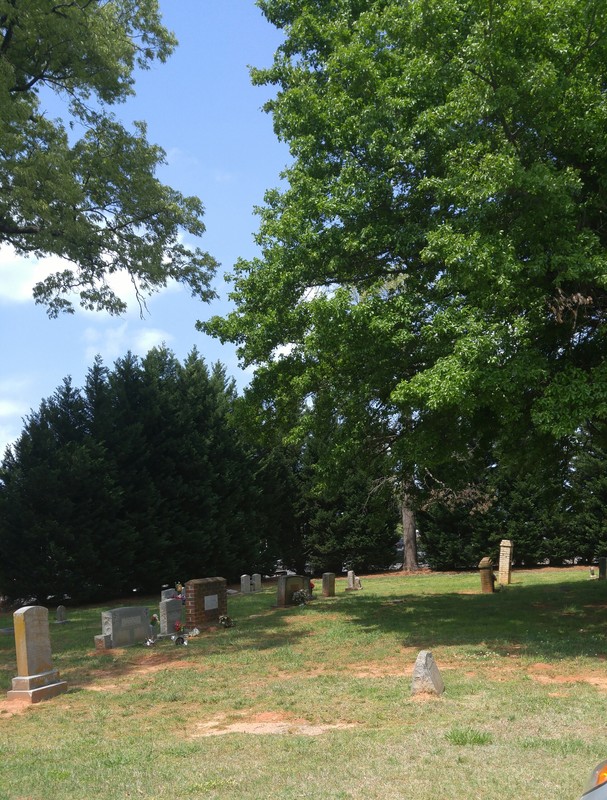
 RSS Feed
RSS Feed